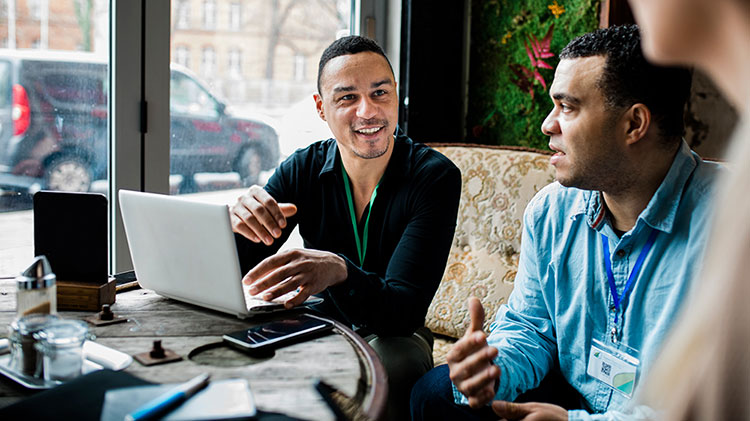Small business benefits to offer
Benefits are a crucial part of an employee’s compensation package.
Leading your own small business may mean attracting and retaining talent. As an owner, it’s important to build a benefits package to take care of yourself and your employees. Offering benefits as part of a compensation package can go a long way toward attracting employees.
While businesses may be required to offer certain coverages, you can voluntarily offer additional small business employee benefits that may make your employment appealing. Whether you're providing generous sick leave or promoting well-being on the job, there are plenty of small business benefits that can make your business a great place to work. Here's what to keep in mind when evaluating how to offer benefits to employees.
Required employee benefits
Workers’ compensation
Required in every state except Texas, workers' compensation benefits help protect employers and employees from legal action resulting from work-related incidents.
COBRA
If a business has more than 20 employees and provides health insurance, Consolidated Omnibus Budget Reconciliation Act (COBRA) could provide former employees and their family health insurance for 18 – 36 months for a premium.
Health insurance
If you have 50 or more employees, businesses are required to offer health insurance under the Affordable Care Act.
FMLA
Family and Medical Leave Act (FMLA) may be available for certain life events, such as caring for an ailing relative or having/adopting a child. Employees may qualify for up to 12 weeks of unpaid leave and health benefits when businesses have 50 or more employees who live within 75 miles of the workplace.
Unemployment insurance
If terminated through no fault of their own, employees may receive compensation through unemployment.
Disability insurance
In a few states (CA, HI, NJ, NY and RI), you may be required to offer disability insurance.
Medicare and Social Security
While working, employees pay through employer deductions to cover for future Medicare and Social Security benefits.
Voluntary employee benefits for small business
401k matching
As you are determining how to implement small business employee benefit packages for your staff, 401k considerations are an appealing place to start. 401k accounts can make it easier for your staff to save for retirement and promote financial security. 401k accounts may even provide tax incentives for your small business. Consider offering 401k matching as an added perk, which means the company contributes a set amount toward an employee's retirement savings based on the employee's contribution.
Employee Assistance Programs (EAPs)
Everyone experiences personal issues from time to time. Help your employees by offering EAPs through a stand-alone provider or your health insurance plan.
Volunteer hours
Empowering employees to designate volunteer time away from their desk can do double duty by helping them improve lives while appreciating their own work environment. Designate a certain number of paid volunteer hours — say 30 per year — for employees to help local nonprofits and make a difference in their community.
Paid time-off policy
Paid time-off (PTO) policies can be a critical part of a generous compensation package. Consider offering a flexible PTO policy to cover vacation, sick leave or anything in between that can help employees deal with unexpected challenges. Giving your workers the freedom to use their PTO as they see fit can go a long way toward helping them feel valued on the job.
Health savings accounts
Offering a health savings account (HSA) option — along with a comprehensive group health insurance plan — can be simple and allows employees to get the medical care they need while helping them save money on insurance premiums. As a small business, you'll need to set up the plan with a health benefits provider that allows employees to contribute pre-tax dollars to the HSA.
Wellness perks
With so many hours on the job, employees want to feel that a company truly cares about their well-being. Gym membership reimbursement, implementing a "no-meetings" day each week and offering standing desks are some easy tweaks that can create a respectful and uplifting work environment.
Flexible work setups
As you consider how to offer benefits as a small business, remember not every incentive has to be financial. Even if you're not enabling your staff to go 100% remote, many workers are craving a hybrid workweek so they can spend some time working from home. Consider offering flexible working policies — even if you're promoting just one day out of the office — to help retain talent.
Benefits to consider if you are self-employed
If you are self-employed, it is also important to build a benefits package that allows you to take care of yourself now and into the future.
Health insurance products can help pay for medical expenses. If you elect for an option with a copay, you'll need to plan to pay a certain amount for every visit to the doctor. Another option is coinsurance — it outlines a percentage you'll need to pay after the deductible is met.
Life insurance is a product that pays a death benefit when the insured passes away, which can be used by beneficiaries to pay off debts and help protect the business. The two common life insurance options are term and permanent. Term insurance is temporary and is generally less expensive. Permanent insurance typically lasts the life of the insured and may build cash value. You could access the cash value that's built for some expensive life events — as long as you make sufficient payments to keep the policy in force.
Retirement planning helps you build for the future. Traditional accounts offer tax breaks up front, but you'll have to pay taxes once you retire. Roth accounts don't have upfront tax breaks, but you'll likely have tax-free withdrawals in retirement.
Disability insurance offers relief by providing income if you can't work because of a disabling illness or injury. The percentage of income replacement promised to be paid when you start to receive your payouts is called a benefit percentage.
Now that you have read about benefits package options for small businesses or benefit choices when you are self-employed, you might be interested in small business operations tips or suggestions about business loss prevention. And consider contacting a State Farm® agent to learn about different business insurance options.




